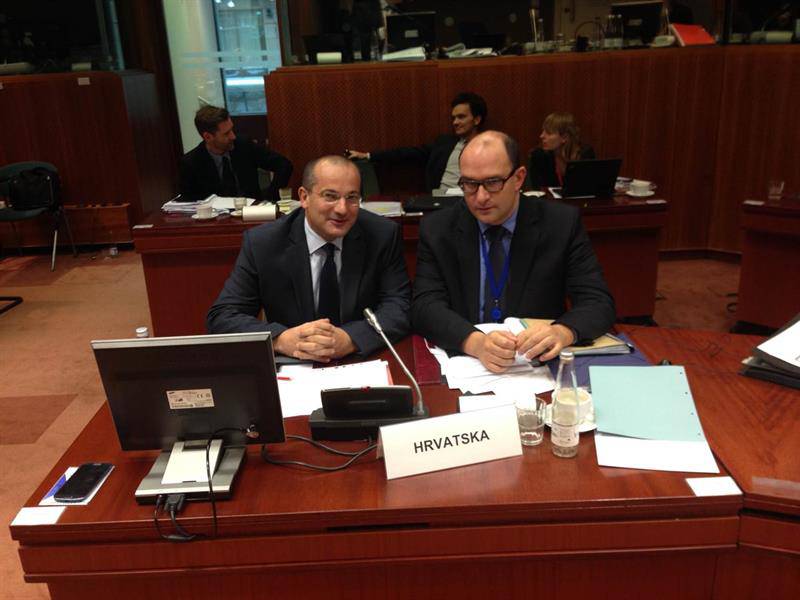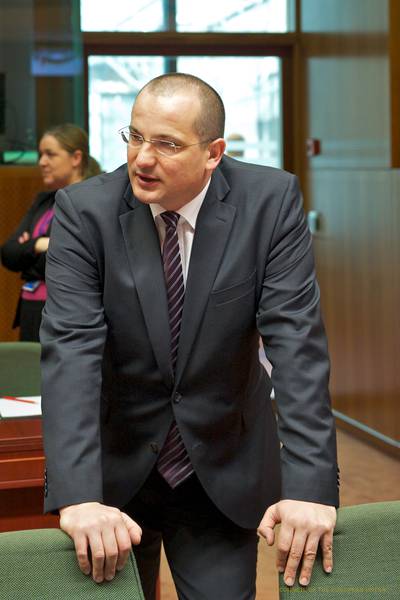Croatia Is Reforming Its Judiciary Without Monitoring
Adelina Marini, January 30, 2014
 Every time when I read the European Commission's reports on the Cooperation and Verification Mechanism (CVM) in the area of justice and home affairs, it reminds me of the slices of bread with jam in the Sofia District Court that I once found officials spreading in front of their switched off computers one afternoon some years ago. Then I was suing the traffic police - a trial that was as absurd as the decision of the traffic police, but the details are not what is important here, although I still see the picture - piecemeal renovated interior in the old building of the court next to the Bulgarian National Radio. The hall room, where I had to go, was freshly equipped with computers on every desk. All of them switched off. A woman above the average age was spreading jam onto slices of bread in front of the computer while I was begging her to give me what I needed.
Every time when I read the European Commission's reports on the Cooperation and Verification Mechanism (CVM) in the area of justice and home affairs, it reminds me of the slices of bread with jam in the Sofia District Court that I once found officials spreading in front of their switched off computers one afternoon some years ago. Then I was suing the traffic police - a trial that was as absurd as the decision of the traffic police, but the details are not what is important here, although I still see the picture - piecemeal renovated interior in the old building of the court next to the Bulgarian National Radio. The hall room, where I had to go, was freshly equipped with computers on every desk. All of them switched off. A woman above the average age was spreading jam onto slices of bread in front of the computer while I was begging her to give me what I needed.
Instead of switching the PC on, however, she started rummaging through a pile of red files. She took one out and gave it to me with an imperative tone to seek myself what I needed. To put it mildly, I was mad, first because of the attitude and second because of the amounts of money I imagined were paid for those computers and also for the wage and bonuses of the female official with the slices of bread with jam she gets every year. And this is in the capital city of Bulgaria that joined the EU under condition that it will complete (not start!) the reform of its judiciary. However, several years later the slices of bread have won and the 2014 European Commission report shows that the Bulgarian authorities have entirely given up working on the agreed benchmarks in the CVM.
In the meantime, the EU adopted in the summer of 2013 its 28th member state. Without a mechanism and with visibly established habit of reforms. Although in the very beginning of its membership Zagreb scared the EU by trying to prevent the extradition of the former boss of the Yugoslav and later Croatian secret services Josip Perkovic to Germany, where he is to stand trial for the murder of Stjepan Djurekovic, Croatia impresses pleasantly as a country which does not need to be forced to reform its judiciary system. News from USKOK - the Croatian special prosecution for the fight against corruption and organised crime - or from the Commission on Conflict of Interest come on an almost daily basis. The ten-year long sentence of Ivo Sanader, the former prime minister, proved not to be aimed at please Brussels to adopt Croatia without the Bulgarian-Romanian mechanism, but is a practise that has seemingly established roots in post-Yugoslav soil.
An uninterrupted fight against corruption and conflict of interest
So far, Croatia can boast a broken practise of trading with exams in the economic faculties of universities in Zagreb and other Croatian cities. Operation "Hippocrates" has led to indictment of more than 300 doctors suspected of corruption with the participation of a pharmaceutical company. On target of the two key for the transition toward democratic society and fair market economy institutions are also sitting politicians, not only former, as such concerns often raise non-governmental organisations and MEPs, like Romanian Monica Macovei. Very recently, the anti-conflict-of-interest commission ruled Zeljko Sabo, the mayor of the city of Vukovar, to pay a 5000 kunas fine (approx. 700 euros) in two instalments over a two-month period for being a member of the supervisory board of the Borovo company and also for being a member of the board of his own company Veki Va. As a state official he has no right in participating in company boards in spite of the fact that the commission found that his company was not functioning for years. The law, though, is a law. And even the tears Mr Sabo demonstrated during his public hearing before media did not help.
With 9000 kunas (1150 euros) was fined Milorad Pupovac, a member of the party of the Serb minority in the country and a member of Parliament, for not leaving the supervisory board of Tesla bank. But the biggest fish in the commission's net recently has been the deputy of, probably, the most powerful minister in Zoran Milanovic's cabinet - Slavko Linic, the minster of finance. In the past weeks, the most media covered scandal is related to Branko Segon, deputy minister of finance. Currently, the anti-conflict-of-interest commission is checking whether Linic's assistant is in conflict of interest being a member of a company that received a loan from the state-owned Croatian Bank for Recovery and Development. Similar to the Bulgarian Development Bank, the Croatian, too, borrows much more favourable loans to private companies. However, Segon has a 0.5% share in the company that received a big credit, Facta Vera Ltd.
The commission will rule on the case in ten days time whether Mr Segon is in conflict of interest, but the scandal caused a huge blow to the confidence in the government and the calls for Minister Linic's resignation are becoming more frequent.
A large scale judiciary reform
To these examples which do not exhaust the USKOK's and the commission's activities at all, we should add the announced in mid-January large-scale judiciary reform, the purpose of which is to make the system more efficient, faster and to cut costs for citizens and businesses. Among the novelties is something the European Commission requires from Bulgaria through the CVM, which is to ensure balanced burden of courts because, currently, there are overburdened courts and courts that almost have no work at all. There is another familiar thing from the Bulgarian reports that is mentioned in the reform and that is "reasonable period of time". The analysis of the Croatian Ministry of Justice shows that currently there is a weak possibility for specialisation of judges which Boyko Borissov's government interpreted a few years ago in the European Commission's report as a recommendation to establish  specialised courts. Besides, some judicial proceedings are prolonged and resources are not used efficiently enough.
specialised courts. Besides, some judicial proceedings are prolonged and resources are not used efficiently enough.
Currently, there are 208 judicial bodies in Croatia of which 67 district courts, 61 crime courts and 33 district state prosecutions. Orsat Miljenic, the minister of justice, proposes with the reform the judicial bodies to be reduced to 95, the district courts to 18 and the crime courts and district prosecutions to 15 each. The minister's presentation is very detailed and reveals a profound analysis of the current striation of Croatia's judicial system. The minster's ambition is the reform to be completed by the end of the year.
Police chiefs begin work on equal footing with their subordinates
Separately, one of the very interesting news in the past days is that in small Croatian municipalities a pilot programme is to be launched which will take police chiefs out in the street. This is planned for small police bureaus, classified in third category. In order to increase police's efficiency on the ground and to reduce spending, given the formally launched excessive deficit procedure, police chiefs, too, will patrol the streets and will work just like their subordinates. Instead of sitting in the warm offices, police chiefs will be engaged in operational work on the ground. This is a very nice example for Bulgaria which is among the countries with high number of police officers per capita, a large part of whom work in the administration, in other words - desk police.
Against the backdrop of the Bulgarian pains under the CVM, I cannot miss noting again that Croatia is launching these reforms without being forced by anyone. Except, maybe, by the bad situation of the judiciary, inherited from the Yugoslav communist period. Another reason is the very poor state of the country's public finances, which has a budget deficit of more than 5 per cent of gross domestic product and the government debt will exceed the minimum threshold of 60 per cent of GDP as allowed in the Stability and Growth Pact. Painful spending cuts are to be made and only efficiency in the administration could help achieve real success. Will Croatia succeed, is still too early to judge, because, as Minister Miljenic said himself, strong resistance is expected from within the judiciary.
The lesson from the attempt for reform is that the focus on chapters related to the establishment of rule of law during the accession negotiations with the EU delivers. In the end of the day, Zagreb probably has realised that reforms are necessary not for the sake of Brussels's approval, but because they are needed for the prosperity and wellbeing of society. Hopefully, the government will have the strength and courage to complete this reform and will also to launch the other reforms in the rest of the crucial sectors of the Croatian state like the economy, labour market, education, health care and pension system. The faster these reforms are launched, no matter how painful, the faster they will prevent the brain-drain to the horror of UK, the Netherlands or Germany. Croatia has a transition period of at least three years to prevent hysteria from a Croatian invasion in Britain and the Croatian government has two years till the end of its term to be remembered with the launch of historical reforms or as another one that scattered the Croatian potential for the sake of a few more votes.
 Kolinda Grabar-Kitarovic | © KGK
Kolinda Grabar-Kitarovic | © KGK Jozo Rados | © European Parliament
Jozo Rados | © European Parliament Aleksandar Vucic, Andrej Plenkovic | © Vlada RH
Aleksandar Vucic, Andrej Plenkovic | © Vlada RH